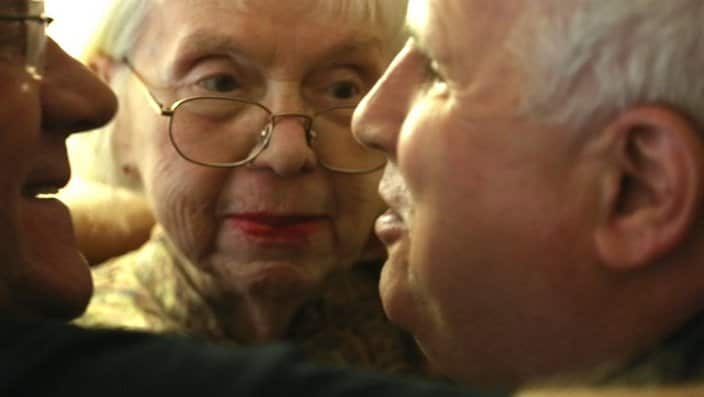One of the stand-out documentaries screening at this year’s Jewish International Film festival is ‘Aida’s Secrets’, a powerful story about Holocaust secrets and the repercussions and effects that they have years later on family.
“It is a family story,” director Alon Schwarz tells SBS. “About my uncle Izak, who was brought to Israel after World War II.”
Jeffrey Kluger wrote in his review for that the film, “is in some ways a very small tale about some very ordinary people”.
Yet it is also a true story that is more far-fetched that a Hollywood story.
Detailing the story of his uncle, Schwarz explains, “He was born at the displaced persons camp of Bergen-Belsen [in northern Germany] which was a very terrible concentration camp during the war.”
“He was one of 37 babies brought to Israel and adopted in Moshav Kfar Yedidya [a town in central Israel] and he grew up without any knowledge that he was adopted.
“At the age of 11 he found out, and at the age of 13 his natural mother came to visit him.
“Her name was Aida and she lived in Canada.” Like the many Holocaust survivors of her generation, Aida didn’t want to talk about the past.
Like the many Holocaust survivors of her generation, Aida didn’t want to talk about the past.

The eponymous Aida of the documentary 'Aida's Secrets' Source: Handout
“All she told him was that he had a father called Grisza and that his father died in the war,” Schwarz says.
“A few years ago I was visiting him and my aunt Rachel and he told me that he found birth certificates at Yad Vashem [the World Holocaust Remembrance Centre based in Jerusalem] that led him to the conclusion that he had a sibling.”
Schwarz remembers, “There was a birth certificate of a boy, with the same parents who was born 11 months after him.” Another hidden secret – this time Schwarz’s secret, added an extra twist to the story.
Another hidden secret – this time Schwarz’s secret, added an extra twist to the story.

The eponymous Aida of the documentary 'Aida's Secrets' Source: Handout
He explains, “What he didn’t know and he was shocked to discover was that I, as a child, had heard that he had a brother from an old lady at Kfar Yedidya and I was sworn to secrecy.”
Izak did not take the news well.
“At that moment he was so furious that I didn’t tell him and threw me out of the house. I didn’t sleep that night.”
And yet that’s where his filmic inspiration began
“That was the start of my documentary,” says Schwarz.
“What happened next was an unbelievable set of events. I was led to Shep, a blind Canadian man who [turned out to be] Izak’s brother.”
The documentary shows them successfully tracking down the mysterious brother. “We found the brother!” Schwarz says, clearly proud of the reunion.
“We found the brother!” Schwarz says, clearly proud of the reunion.

Brothers Izak and Shep in the documentary 'Aida's Secrets' Source: Handout
“We have them meet after 65 years and what was shocking was that their mother Aida was living in Canada as well and Shep never met her.”
“We had a double reunion.”
Alon Swarz told SBS that the remainder of the film becomes a detective story to find out what happened in the displaced persons camp after the war.
”What I discovered that the notorious place associated with dead bodies, after the war was a totally different place,” he says.
Schwarz was surprised at what he discovered.
“Life flourished there,” he says. “They had shows, and they made a lot of babies. I was shocked to discover that.”
“It is a very inspiring story,” sums up Schwarz.
Listen to the full interview with Alon Schwarz from SBS Hebrew Radio, here:![http://audiomedia-sbs.akamaized.net/hebrew_161102_579516.mp3 image]()
 More about the film:
More about the film:
LISTEN TO
http://audiomedia-sbs.akamaized.net/hebrew_161102_579516.mp3
06:49

Brothers Izak and Shep and their mother Aida in the documentary 'Aida's Secrets' Source: Handout
With a true story that is more far-fetched that a Hollywood movie, the heroes of the documentary are:
- Schwarz’s uncle, Izak Szewelewicz, a 68-year-old gardener, now living in Israel;
- Shep, who was visually impaired from birth and blind most of his life (nearly all of which he has lived in Winnipeg, Canada);
- Their mother Aida, 90, who lives in a Quebec nursing home;
- Their father, Grisza, who died in 2008.
The father was Jewish, the mother was not, both were born in Poland and both found themselves in the German displaced person’s camp Bergen-Belsen after the war, where Izak and Shep were born.
Aida gave the boys up when they were still babies.
Why did she do it?
Why did she keep in touch with Izak and not with Shep?
Why does answer the questions she chooses to answer and ducks the others with a simple, “I don’t remember, I don’t remember.”
Is she telling the truth? Find out yourself!




